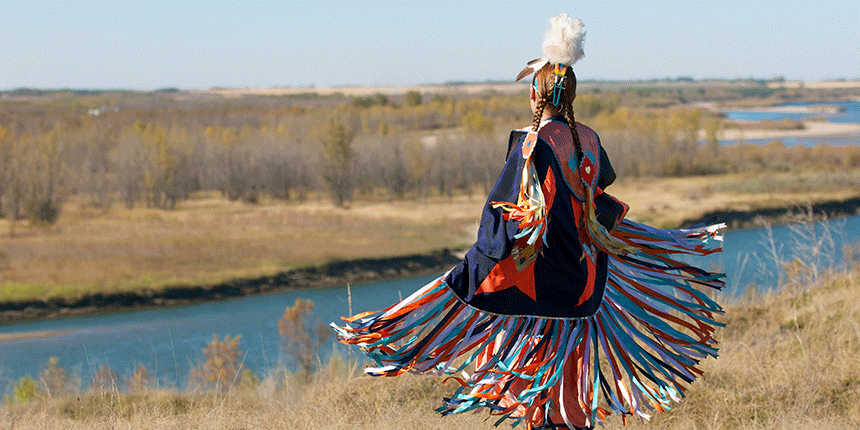

On March 3-5, the 2023 AISES (American Indian Society for Engineering and Science) in Canada National Gathering brought together Indigenous people and their allies from across generations to learn from one another and share their work and experiences. At the gathering, Engineers Canada co-presented on the forthcoming Guideline for engineers and engineering firms on Indigenous consultation and engagement. The information shared on the guideline was well received, particularly because it resonated with thinking on influential documents pertaining to Indigenous rights released in recent years—among others, the UN Declaration on Rights of Indigenous People (UNDRIP), the Truth and Reconciliation Commission Calls to Action, and the report on Murdered and Missing Indigenous Women Calls to Justice.
Information on the guideline was co-presented by Gayle Frank and Danilo Caron, the consulting team from Urban Systems who facilitated the guideline’s creation, and Ryan Melsom, Manager, Qualifications from Engineers Canada, who oversaw the project development and volunteer management throughout the project cycle. At the highest level, the guideline represents a shift from a “tick-box” approach to consultation, which has failed to protect the Indigenous public multiple times throughout Canada’s history, to a truer model of engagement, which emphasizes the importance of long-term relationship building, community involvement, and integration of Indigenous Knowledge, among other key areas, in pursuit of better engineering outcomes for Indigenous communities. In general, there is clarity among Indigenous communities that the Crown’s duty to consult will and must be superseded by a more meaningful, respectful model involving what UNDRIP labels “free prior and informed consent”. The shift this represents is from a model of equal collaboration on engineering-related projects to one of consent granted by sovereign Indigenous nations.
The National Gathering is special in that, unlike a typical, single-focus professional conference, the event takes a much more holistic view of what it means to be a professional. Integrating academic research, industry presentations, intergenerational participation, company recruiting, spiritual practices, cultural practices, local Indigenous customs, family participation, high school outreach, and more, the conference provides a welcoming, open-ended environment, where people are encouraged to bring in their personal stories and values to the proceedings and, ultimately, to their professional lives in STEM-related fields.
According to Marcie Cochrane, a member of the Canadian Engineering Qualifications Board’s Practice Committee, which developed the guideline, the guideline represents a positive step forward for the profession because of the process by which it was developed. In Cochrane’s view, the development process “involved extensive consultation through a series of gatherings that wove storytelling and first-person perspectives into the process.” The benefit of this approach, was that it “built empathy and understanding among participants and those involved.”
“In sharing this work, we were encouraged by the positive reception of this information by Indigenous professionals, academics, and other community members”, notes Melsom.
“We do, however, recognize that this is only a first step by Engineers Canada, with significant limitations in terms of what it can accomplish. Nobody is required to use it, for starters, but our hope is that leaders in the engineering field will recognize its benefits and act.”
While Melsom notes that over 50 per cent of participants were Indigenous in the gatherings that contributed to the guideline, “this represents the tiniest fraction of the true diversity of Indigenous communities and individuals in Canada.”
Sam Inchasi, who chairs the CEQB Practice Committee, notes that “The guideline’s development represents a significant achievement for the CEQB’s Practice Committee, one which will provide an ongoing, practical framework for effective and meaningful engagement with our Indigenous communities across Canada when developing engineering projects. The journey involved a unique consultation approach (through hosting of workshops and regional/national gatherings) that contributed to the document’s successful development and allowed for an inclusive form of collaboration and sharing of experiences as we all deeply reflected on Truth and Reconciliation, Indigenous values, and Indigenous ways of knowing. There is still much to do in creating better relationships and improved community outcomes, and we hope the guideline will help along this journey.
Inchasi also notes that “None of this would have been possible without Urban Systems Ltd., our consultant who supported the engagement and development of the Guideline, the truly engaged members of the Practice Committee and CEQB, Ryan Melsom, Manager, Qualifications and CEQB Secretary, as well as the important guidance from Engineers Canada’s Indigenous Advisory Committee (IAC).” IAC Chair, Sheldon Baikie, was also present at the National Gathering along with members of Engineers Canada’s Belonging and Engagement team.
The Guideline for engineers and engineering firms on Indigenous consultation and engagement is planned for approval by the Engineers Canada Board at its meeting on May 26, 2023. Once it is approved, Engineers Canada will aim to share the work widely through its online communications, outreach programs, and professional activities.
“An ideal outcome would be to see this type of work integrated into regulation, education, and continuing professional development,” says Melsom. “We’re committed to adding value to this work and honouring the collaborative contributions of everyone who participated in its development.”


